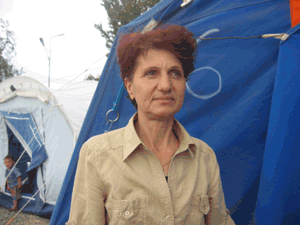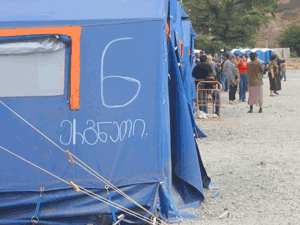 Tea Topuria
Tea Topuria
The situation is changing rapidly on a daily basis. Approximately 50, 000 inhabitants of Gori have vacated the city all together. However, the total population has not changed, and has even increased by two fold with the latest wave of IDPs as a result of the Georgian-Russian war. Tent city for IDP camps were erected in fields not far from the city center and designed to accommodate thousands of people.
The city of tent camps has its own streets and districts. Some camps are used for living and some for the purpose of distributing food, registering IDPs and so on. You can tell from queues and number of people in front of the camps. Some camps are rich, some are not. There are beds and is some cases TV-sets in rich camps and mattresses in poor ones. The conditions in camps depend on what kind of aid they had received and if they brought money with them.
Many camps are empty. IDPs living in Tbilisi and other regions of Georgia will be eventually be moved there. The schools and nursery homes where IDPs live must be emptied in order to start back to school studies on time. Some people have began visiting IDPs and advising them of the need to return to Gori, as they will have to go there, either way, and sooner or later. The IDPs do not have normal diets and access to a balance diet. This objective of forcing IDPs to move to Gori camps is based on expediency. The IDPs do not have much to choose from: either sleeping on desks and eating strange American food, they are sleeping in a brown tarpaulin camp on the ground and are able to have normal food. “Insects crawl on the ground and the children are frightened,” I was told in a camp. “I do not know if the camp roof is leaking. It has not yet rained but things are starting to get worse as it has been very cold some nights.”
Several women were standing at the entrance. “Have you brought us any clothes?” We say we have only a bit of food. “You’d better give it to the old people. If you start distributing they won’t get any.” Old people are sitting nearby on chairs. They can not fight for food in queues because of their old age and often poor health conditions. Sometimes they are hungry. One of them took porridge. He said this is what he usually eats in the camp as it is easy to prepare. It needs only boiled water from preparation. They can not boil or fry anything in camps. They get warm food from humanitarian organizations in disposable dishes. Some aren’t able to eat such food because of the trauma they are experiencing.
There was always a chance of starting a war. However, these people from camps have not yet realized that all this happened to them and not with their grandparents such as when Leningrad was blockaded during WWII. The IDPs say the situation in villages is very difficult. The harvest is completely destroyed. The inhabitants of villages in Gori district had been supporting themselves by selling apples. They used to sell apples; they were proud of apples. Now those who remain in villages hide under apple trees if there is an upcoming threat.
“My son is in the village now. All the apples have fallen on the ground from the explosions. He said we can not collect even 100 boxes of apples. We used to collect 800,” states Marina Giguashvili, an inhabitant of Tkviavi village.
This woman is very concerned about the harvest. No one can refuse someone everyday life just like that. The same happened with the IDPs from Abkhazia 15 years ago: “We were in very difficult conditions. We did not even have coffee,” told one IDP to a journalist who left Abkhazia through Svaneti. IDPs had been walking in mountains for several days. It was freezing at night and loaves of bread were dropped to them from helicopters. IDPs from Kartli are staying in camps because all empty buildings have been occupied by 300,000 IDPs from Abkhazia.
It was already too late when the villagers realized that a real war had begun. They were forced to leave everything behind - clothes, money and other personal belongings. Dali Kasradze is from village Ergneti. This village is on the border and there had been a bazaar there for years. Georgians, Ossetians and Russians traded there. One could buy goods on any kind of currency.
Dali Kasradze: “We had always heard shootings. However, we had never gone into a basement to hide. It happened on August 3rd for the first time. Ossetians started shooting at 9:15 p.m. and ended at 7 a.m. Then Georgians started. However, they were not as active as Ossetians. Shooting stopped only the next day. Everything happened very fast afterwards. If we had been warned this would not have happened to us.
My husband left the village on August 10th. He was stopped by Ossetians. They opened fire. He thought he would not survive. He backed the car, jumped out and ran to Tirdznisi. Georgian soldiers took him from there.
Everything has been stolen from Ergneti. Houses were burned, with only 30 houses having partially survived. They say Tamarasheni is being destroyed with bulldozers.”
Bombs and Russians
Marina Giguashvili, Tkviavi: “My neighbor said that there is such a big hole in my yard that three trucks are needed to fill it. A bomb hit my neighbor’s house and tore it in two. Houses are burnt. Some were burned by Ossetians and others from neighboring houses that were on fire. One of my neighbors was trapped in the basement and burned alive in his house. Only his arm was found. His ashes were hardly collected.
One person was found dead after five days of lying in the yard. Neighbors found him. The deceased were buried in yards as they could not be taken outside.”
There are only several people in Tkviavi. IDPs can not dare going there. More IDPs go to Karaleti. They are afraid but still go there.
“I was in Karaleti this morning. On my way back I saw one tank and 5 cars filled with soldiers that were being deployed in Karaleti. I do not know if I’ll return there in the near future,” states Maia Zazarashvili from Karaleti.
She said Russians are not intending to leave Karaleti. They even made a small power station on the river. However, they have not entered civilians’ houses and are staying in their camps. They dug trenches but the groundwater seeped in and flooded the Russians. This caused much anger.
“The Ossetians took everything: TV-sets, video apparatus, clothes… They even brought a truck to load the furniture from one house. Shops were set ablaze as well as the houses.
brought a truck to load the furniture from one house. Shops were set ablaze as well as the houses.
Russians do not hurt us. Ossetians wanted to enter into Georgian villages when they celebrated the recognition of their independence but Russians stopped them. They killed 6 Ossetians at that time. One of our villagers asked Russians when they were planning to leave. They said they did not know. They also added they wanted to go as soon as possible,” says Zazarashvili.
The IDPs say some aggressors are kind and some are not:
“There is one patient in the Gori Hospital. He lived in Ergneti. He did not wish to leave his house and treated occupants to stay alive. One day Russians asked him to see his family album. They saw the picture of a boy in soldier’s uniform in the album. When Russians found out that the boy was the man’s son they beat him with gun butts and threw him in a channel.
There was a 77-year-old man in the village that was bent over from the old age. He was walking down the street with a loaf of bread and tomatoes in his hands. The occupants saw him. They thought he was trying to escape and shot him. They killed an innocent man, “stated Dali Kasradze.
There are few notes from the occupied villages. There is no electricity there and those who remain in villages can hardly charge mobile phones and contact their relatives some of whom live in the city of camps near Gori. The IDPs do not know what will happen with them. Winter is coming and it is already cold in camps. The IDPs have no place to wash themselves. The Gori inhabitants visit them and take them to their homes so that they can have a shower. However, this problem is nothing compared with another one:
“They started building toilets and shower cabins. I think they are not planning to take us back to our homes and this frightens me, says Marina Giguashvili from Tkviavi.



